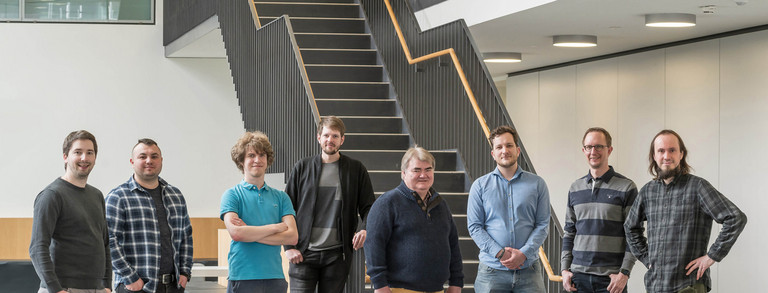Prof. Dr. Günter Rudolph
Curriculum Vitae
11/1996 Doctorate in Computer Science (Dr. rer. nat.), University of Dortmund
04/1991 Hauptdiplom in Computer Science (Diplom-Informatiker), University of Dortmund
04/1987 Vordiplom in Computer Science (cand. inform.), University of Karlsruhe (TH)
06/1983 General higher education entrance qualification (Abitur), Ruhr-Gymnasium Witten
04/2005 - today University Professor, Faculty of Computer Science, TU Dortmund University
06/2001 - 03/2005 Product and software developer, Parsytec AG, Aachen
01/1997 - 05/2001 Research assistant, Collaborative Research Center 531, University of Dortmund
02/1994 - 12/1996 Research Assistant, Computer Science Center Dortmund (ICD)
05/1991 - 01/1994 Research Assistant, Department of Computer Science, University of Dortmund
Current fields of work
The term computational intelligence (CI) refers to the study of information processing in natural, particularly biological, systems and the implementation of the knowledge gained in this process in algorithmic concepts for problems that are difficult or impossible to process using conventional methods on digital computers. Originally, only the algorithmic concepts of artificial neural networks (NN), evolutionary algorithms (EA) and fuzzy systems (FS) were attributed to CI. These have since been supplemented by the algorithmic concepts of swarm intelligence (SI) and artificial immune systems (IS). Fuzzy systems emulate the human ability to successfully process information even with fuzzy terms and information and to draw conclusions from it. Typical areas of application are fuzzy controllers and, increasingly, knowledge discovery (data mining). Artificial neural networks are the algorithmic implementation of biologically inspired models of information processing in the brain and nervous system. Instead of having to explicitly program and analyze a solution path, the ability of neural networks to learn a solution strategy based on presented examples is used. A typical area of application is pattern recognition (e.g. for anomaly detection, signal classification or speech recognition). In evolutionary algorithms, the process of variation and selection in the context of genetic inheritance is understood as an iterative improvement process and implemented accordingly. Typical areas of application are optimization problems for which no special mathematical optimization methods are available. In the concept of swarm intelligence, the desired overall behavior of a system is produced by the networked individual behavior of numerous individuals without central control. For example, modelling the social behaviour of ant colonies leads to the so-called ant algorithms for combinatorial optimization, while particle swarm methods are modelled on the movements of flocks of birds or fish and are used for continuous optimization. The artificial immune networks are inspired by the immune system of vertebrates, which can differentiate between the body's own and foreign cells and dynamically store this knowledge in the immune system. A typical area of application is pattern recognition and, in particular, classification. Our areas of work in the field of CI can be roughly divided into three main areas: Theory: In order to understand CI methods, a detailed formal analysis of how they work is necessary. This also includes a theoretical consideration of the performance of these methods in various fields of application. Operationalization: The extent of success in the application of CI methods depends largely on the experience and intuition of the CI expert involved. In order to help even less experienced CI users to achieve success, we develop formal guidelines and instructions on how the theoretical algorithmic CI concepts should be reliably implemented in a concrete application. Application: In addition to classic application developments in the fields of mechanical engineering, electrical engineering and chemical process engineering, biotechnological problems are now increasingly being addressed.
Further information
- The Chairman of the Examination Board since 14.07.2021 is Prof. Dr. Mario Botsch.
- From 14.07. 2021, applications for recognition of examination results will be processed by Prof. Dr. Thomas Liebig.
- Attention: Module changes from winter semester 2014/15 - Module INF-BSc-305 Introduction to Computational Intelligence: written instead of oral examination - Module AR-MSc-306 Computational Intelligence: written instead of oral examination
Consultation hours:
- Tuesdays 10:30 - 11:30 (during the lecture period, otherwise by appointment)
Examination dates: by arrangement.

